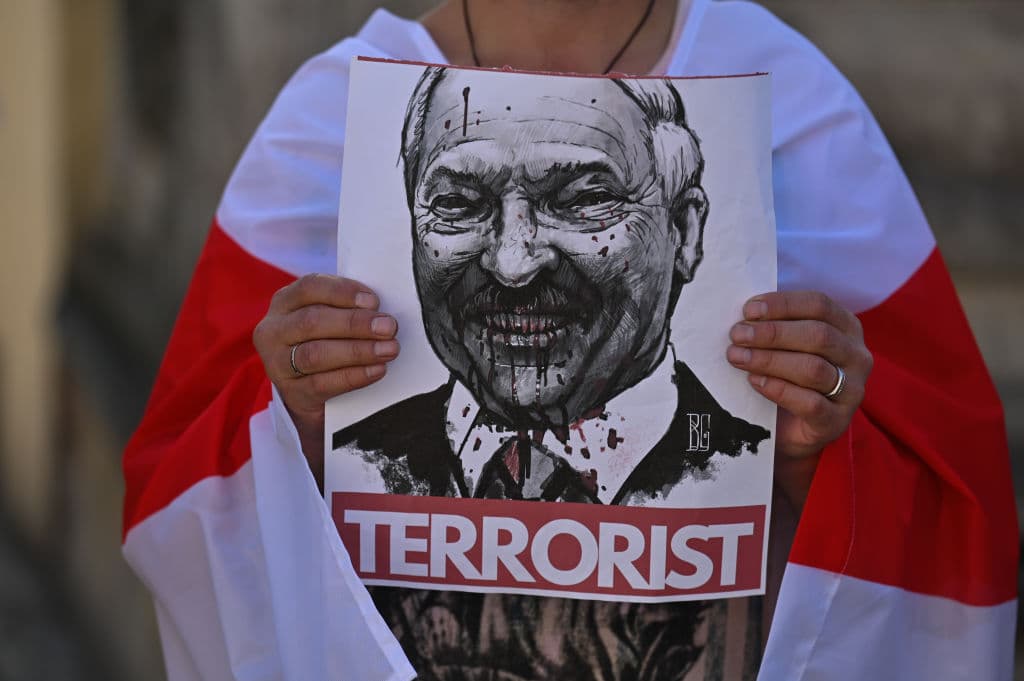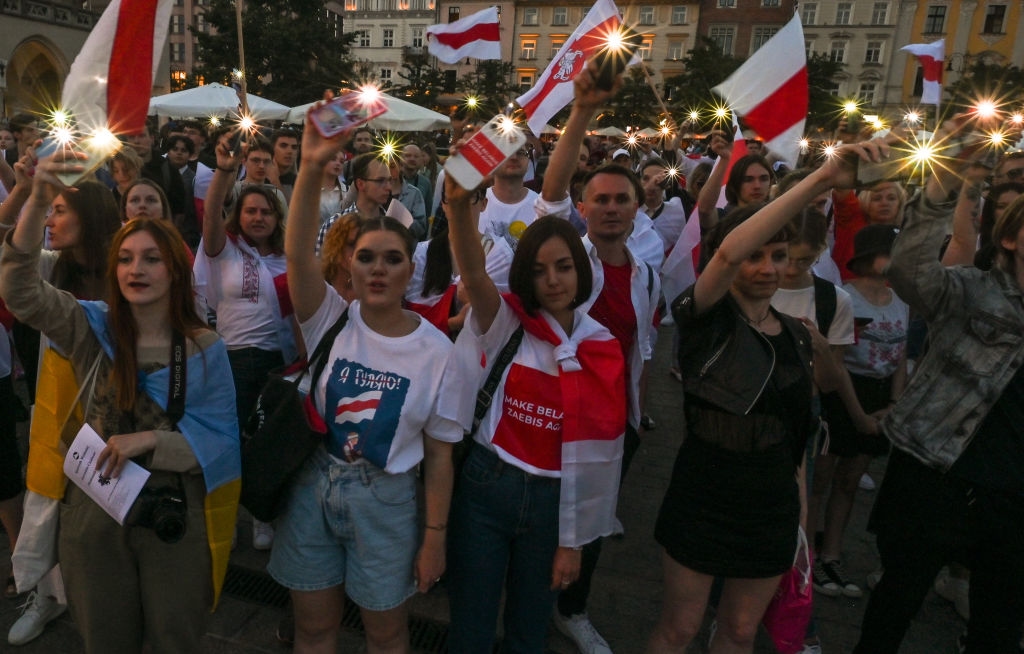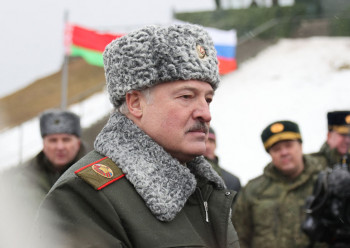Belarus Weekly: Belarus allows Russia to use two military bases for 25 more years

Military exercises continue on both sides of the border as Minsk focuses on improving offensive operations while Kyiv bolsters its demining and defensive efforts.
Belarus allows Russia to use two military bases for 25 more years. Minsk also unveils the first units of the long-awaited "people's militia."
Meanwhile, Belarusian volunteers fighting alongside Ukrainian forces take part in Ukraine's counteroffensive in Kherson Oblast, suffering losses.
The regime of Belarus' dictator Alexander Lukashenko slashes the independence of self-employed entrepreneurs by proposing an increase in income tax, which experts believe will perpetuate the decrease in the labor force.
The European Parliament calls to "reconsider" its diplomatic relations with Minsk, calling the detention of its senior diplomat in Minsk "unacceptable and deplorable."
Meanwhile, the EU also establishes a "contact group" to foster regular dialogue with the Belarusian civil society and democratic opposition forces.
Two Russian military bases remain in Belarus for 25 more years
Russian use of two Belarusian military bases – Baranovichi and Vileika – was prolonged for 25 more years. The previous agreement was signed in 1995 and expired in May 2021, yet remained in possession of Russian forces. The bases were transferred for free.
The Baranovichi station detects and coordinates missile launches, while the Vileika station is a Russian naval communication hub.
Belarusian territory has been used as a staging ground for the full-scale Russian invasion of Ukraine since February 2022. Although Belarusian troops haven't joined the offensive directly, Belarus offered its infrastructure and facilities to conduct airstrikes and rocket launches against Ukraine.
It is reported that Moscow now also controls Ziabrauka airport in the southeastern part of Belarus. Russian military forces were also spotted in the southwestern Brest region.
Belarusian border guards damage border fence to let illegal migrants into EU
Lithuanian border guards published a surveillance camera video showing masked people coming from Belarus and damaging the fence at the Belarusian-Lithuanian border. Migrants later used the breach at the border.
Lithuania and Poland reported increased illegal border crossings, with over 100 attempts registered on Sept. 12. Four days prior, Lithuania prolonged the state of emergency in the areas bordering Belarus.
To curb the inflow of illegal migrants, Poland and Lithuania built 5-meter tall fences 186 km and 550 km long, respectively. The published video proves that the border breaches occurred with the help of Belarusian border control officers spotted with metal-cutting scissors.
The migration crisis at the Belarusian border began in July 2021, when the regime started luring migrants from the Middle East to Minsk with the false promise of easy entry to the EU.
The crisis climaxed in November 2021 when an estimated 20,000 migrants were present in Belarus. Reportedly, 5,000 migrants were stuck between borders facing pushbacks from Polish border guards and coerced to attempt new crossings from the Belarusian side.
Human Rights activists report violence and abuse in the Belarusian Bruzgi refugee camp stationed over 4000 refugees seeking to cross the border.
Belarus draws first unit of 'people's militia,' raises questions who, what, why
On Sept. 11, Deputy Chief of the General Staff of the Armed Forces of Belarus Andrei Matsievich met with 22 members of the newly formed "people's militia" in Lobzha, in eastern Belarus.
One of the militia members was previously prosecuted for assault. According to law, she should not have access to weapons.
Lukashenko ordered the creation of people's militias in Belarus on May 27. According to him, up to 50 people in every town should comprise the unit of people's militia and receive weapons in case of war or civil unrest. However, he warned against the uncontrolled distribution of firearms.
Ukrainian forces conduct drills near border with Belarus
Ukraine's Interior Ministry reported that Ukrainian forces conducted military exercises in Zhytomyr, Rivne, and Volyn oblasts near the country's border with Belarus on Sept. 8.
The exercises conducted by Ukrainian troops involved demining, repelling offensive actions, and countering enemy sabotage groups.
The Ukrainian drills reportedly responded to Belarusian exercises held from Sept. 8 to 14, in which simulations allegedly focused on crossing the Belarusian border with Ukraine.
Deputy Chief of Ukraine's General Staff Oleksii Hromov said Belarus' drills likely focused on taking parts of Ukraine that Minsk deems so-called "lost territories," potentially including parts of Ukraine's Volyn, Rivne, and Zhytomyr oblasts.
Franak Viachorka, an advisor to Belarusian opposition leader Sviatlana Tsikhanouskaya, suggests that Belarus' drills are intended to keep Ukraine on "high alert."
Ukraine's military has noted that the chance of a Belarusian offensive against Ukraine remains low.
Belarusian volunteers participate in Ukraine's counteroffensive, suffer losses
The "Terror" Battalion, comprised of Belarusian nationals fighting as part of Ukraine's military, took part in Ukraine's counteroffensive against Russian forces in Kherson Oblast.
One member, a driver, has reportedly been killed, and five other members have been injured.
As of July, over 1,500 Belarusian volunteers are fighting alongside Ukrainian troops.
EU calls detention of senior diplomat in Minsk' unacceptable and deplorable'
The EU condemned the detention of EU chargée d'affaires in Belarus Evelina Schulz on Sept. 6 by Belarusian authorities, calling the move "unacceptable and deplorable."
Belarusian authorities detained Schulz for two hours at a police station in Minsk after she attended a trial held for political prisoners last week. Following the trial, two Belarusian human rights activists were sentenced to 15 and 6 years in prison.
The European Parliament issued a statement on Sept. 8 saying the detention was a "blatant violation of international agreements ratified by Belarus itself," including the Vienna Convention on Diplomatic Relations. It demanded a review of the EU's diplomatic presence in Minsk.
Council of Europe to launch regular dialogue with Belarusian civil society
The Council of Europe's Committee of Ministers has decided to establish a "Contact group" through which it will hold regular exchanges with Belarusian opposition leader Sviatlana Tsikhanouskaya and other Belarusian democratic opposition forces and civil society.
"As Presidency, Ireland has prioritized institutional support for those who wish to build a democratic and free Belarus, one that will work with its European partners to protect human rights and promote the rule of law," said the Committee of Ministers chair, Irish Foreign Minister Simon Coveney.
On Mar. 17, the Committee of Ministers "suspended all relations" with Belarusian authorities due to its role as a co-belligerent in Russia's full-scale war against Ukraine.
According to Tsikhanouskaya, the ultimate aim is for Belarus to join the Council of Europe once Belarusian dictator Alexander Lukashenko is ousted from power.

Members of the local Belarusian and Ukrainian diaspora protest on Aug. 9, 2022, in Krakow, Poland. (Photo by Artur Widak/NurPhoto via Getty Images)
BYPOL trains first all-female unit to counter Lukashenko's regime
The first all-female unit trained by BYPOL, the organization of exiled Belarusian law enforcement that opposes Lukashenko's regime, has reportedly completed training in Poland.
The women are being trained in line with BYPOL's "Peramoha," or Victory, plan, an initiative intent upon training forces to resist Lukashenko's regime and to restore the rule of law in Belarus. The intended aim is that, when the opportunity arises, the trained forces will be equipped to withstand aggression from the regime's security forces.
BYPOL was founded in 2020 amid the mass protests that followed Lukashenko's fraudulent presidential election win.
Created in August 2021 and supported by Belarusian opposition leader Tskikhanouskaya, over 200,000 Belarusians are said to have registered for the initiative.
As of late August, Belarus' Supreme Court has labeled BYPOL a "terrorist organization."
Lukashenko tightens his grip on entrepreneurs, small businesses
Belarusian Economy Minister Aliaksandr Charviakou said in a meeting with Belarus' Council of Ministers on Sept. 9 that a bill had been drafted to bar self-employed entrepreneurs from using the country's simplified taxation system.
The income tax required of entrepreneurs will reportedly rise from 16% to 20% in 2023 and 25% in 2024.
Lukashenko has also said he wants to restrict the types of activities self-employed entrepreneurs can engage in, although he did not provide further details.
Ales Aliakhnovich, the economic reforms representative at Sviatlana Tsikhanouskaya's Office, noted that the drafted bill would likely worsen the conditions under which many self-employed entrepreneurs in Belarus work. This new measure may also force many Belarusians to shut down their businesses.











